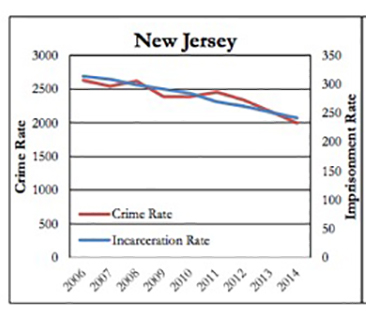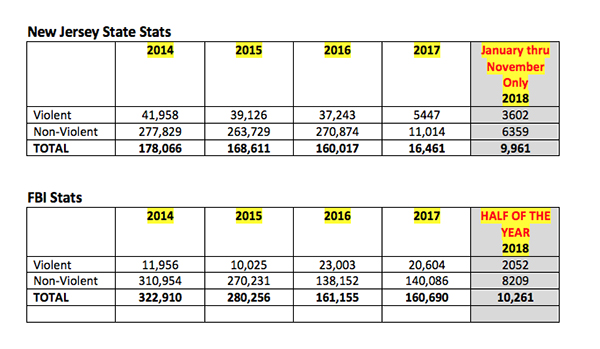New Jersey was the first state to remove cash bail and though news articles continue to be written patting the brave judicial system on the back, they do not have the monetary funds to maintain the program and statistics have not proven the initiative is truly effective.

Though the Reform’s committee members and state officials are enjoying taking the credit for the decline in the state’s crime rate, an article provided by the Brennan Center for Justice at NYU School of Law shows that crime overall had been decreasing steadily in New Jersey since 2011. 
Obtaining yearly totals for overall crime in New Jersey was simple until 2017. The reports were revamped for both 2017 and 2018 to include detailed reports with totals for each crime per county. The change within the report gave the impression that no one wanted it to be simple to realize the year end crime totals.
Below is a table with crime statistics we discovered using the New Jersey Uniform Crime Reports and the FBI Crime Reports. The most recent numbers for 2018 are only preliminary and includes just half of the year at this time. The FBI statistics differ from New Jersey State. It’s very difficult to believe the state’s 2017 numbers are correct.

Lack of Funding
Just this past February, NJ.com published an article stating New Jersey’s new Criminal Justice Reform (CJR) system is going broke. The article is referring to the Criminal Justice Reform Report for 2017 released by New Jersey’s Governor and Legislature. On page five, mentioned under the header ‘Challenges’, it clearly is written, “there are three major challenges to full implementation of this program in New Jersey. Pursuant to the CJR statute, the Judiciary is obligated to report on the revenue collected for this initiative. As of December 31, annual revenue collection for fiscal year 2018 is 2.4% below the revenue collection over that same timeframe for fiscal year 2017. In addition, expenses for the Pretrial Services Program will exceed revenues beginning in fiscal year 2018.
The funding of ongoing court operation through court filing fees is simply not sustainable. Continued success of the Pretrial Services Program requires a stable and dedicated funding stream at an appropriate level through the General Fund, rather than from court fee revenue.
What is a state General Fund?
According to the State of New Jersey Department of Treasury “the General Fund are the funds into which all State revenues, not otherwise restricted by statute, are deposited and from which appropriations are made. The largest part of the total financial operations of the State is accounted for in the General Fund. Revenues received from taxes, except the Gross Income Tax, which is deposited in the Property Tax Relief Fund, most Federal revenue, and certain miscellaneous revenue items are recorded in the General Fund. The Appropriation Acts enacted by the Legislature provide the basic framework for the operation of the General Fund.”
Summing it all up, the tax payers will be paying for this new Criminal Justice Reform program. A program that has not proven to its citizens that it works. In addition, the New Jersey tax payers may be footing the bill for a program that instead actually puts them at a greater risk of danger than the criminal justice system it replaced.
How Has the New Criminal Justice Reform Program Effected Incarceration?
The same Criminal Justice Reform Report also indicated that the new CJR program reduced their pretrial jail population statewide by only twenty percent in 2017 and an overall reduction of thirty-five percent since the program began on January 1, 2015.
However, the program’s committee members and state leaders seem to be willing to ignore funding concerns as long they can continue enjoying the praise they are receiving as ‘the leader of the nationwide movement’ and willing to put their state at risk rather than admit they made a bad decision.
What is Required to Accommodate New Jersey’s New Criminal Justice Reform?
In exchange for this minute change in pretrial incarceration, each county now must meet a 48-hour timeframe for a release decision, which requires judges to work and courts to be open six days per week, including weekends. The program also demands their Pretrial Services Staff take on a heavy load of providing support for hearings, managing caseloads and monitoring and consistently communicating with defendants released on supervised release.
Regardless of the obvious overload on judicial employees, these state leaders continue to embellish the pretrial program and its so-called effectiveness with the statement “through technology enhancements, the Judiciary in eCourts has automated most aspects of the pretrial process, creating efficiencies in case management, as well as affording a streamlined process for court staff’.
Therefore, much of the pretrial process is reliant upon computers. How safe is that? Relying on technology, such as electronic ankle bracelets and computerized risk assessment tools can backfire and already have. The same Criminal Justice Reform Report also indicated under the header, Electronic Monitoring, “Over the first year of operation, the Judiciary has experienced unique challenges related to defendants ordered to comply with an electronic monitoring release condition”.
The New Jersey Criminal Justice Reform program alone has failed its citizens. Another perfect example is used in the NJ.com article. Newark Mayor Ras Baraka blamed the system for releasing a pretrial defendant who was arrested on domestic violence charges who was later accused of murdering his girlfriend.
The Governor and Legislature’s report goes on to explain how education and training are the forefront of New Jersey’s Pretrial Services Program. But how are they going to pay for that? And while they are trying to figure it out, how will the citizens pay for it? Realistically, they will not only pay with tax dollars, but many will pay with their own lives or the loss of loved ones due to the release of violent criminals based on a computer’s analysis of risk. And the government who seems to be more concerned with how many criminals they keep incarcerated rather than the safety of their own citizens.
RELATED: Why Supervised Release Alone for Pretrial is Not Enough


 Serving all of Florida,
Serving all of Florida, 
Recent Comments